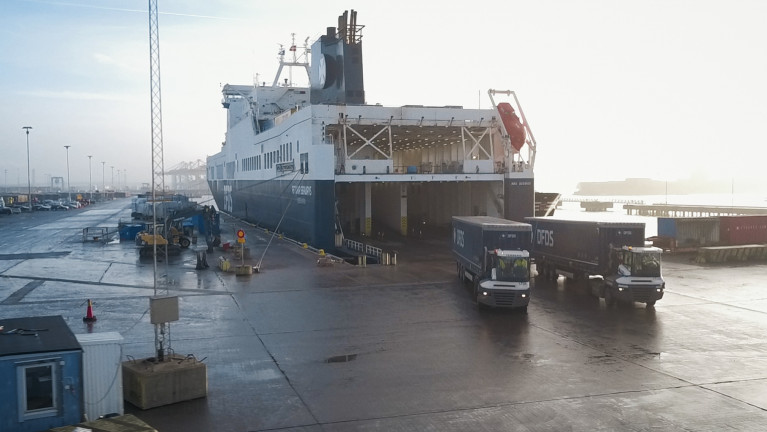Minister for Transport Eamon Ryan, TD and Minister of State Hildegarde Naughton today called again on businesses, freight logistic companies and hauliers to review their contingency preparations for the end of the Brexit transition period on 31st December 2020.
In particular, the Ministers urged businesses who have not already done so, to assess how they will get their goods to European markets from 2nd January 2021 and to consider switching to direct shipping services to the continent.
EuRoRo are today announcing new direct services between Rosslare and Dunkirk from 1 January 2021.The announcement of a new RoRo (roll on roll off) service is a welcome addition to the other new direct ferry services and increased sailing frequencies outlined by the shipping sector over the last number of months.
Since May a number of new services and increased sailings have come on stream, including new RoRo services from Ireland to Zeebrugge (Belgium), Santander (Spain) and Portugal by CLdN. In addition increased frequency by Irish Ferries and Stena Line on the Ireland/Cherbourg routes.
New LoLo (lift on lift-off) and Bulk services have also been added in the period. Such announcements reinforce the findings of the recent report (here) of the Irish Maritime Development Office (IMDO) that the shipping industry is resilient, responsive and capable, of adjusting to and satisfying market demand, without State intervention,.
90% of Ireland’s international trade in volume terms is imported and exported by sea through our network of ports. Given the importance of maritime connectivity and our maritime supply chain to our economic wellbeing, a priority of Government has been to ensure that all the elements of this vital supply chain continue to function when the Brexit transition period comes to an end.
Welcoming details of the new Rosslare to Dunkirk service the Minister for Transport Eamon Ryan T.D. said: “This new service, operated by EURoRo Seaways and DFDS from Rosslare to Dunkirk, is a welcome addition of capacity as the Brexit transition phase comes to an end. Together with the increased sailing frequencies to Cherbourg announced by both Irish Ferries and Stena Line and the new direct routes launched by CLDN, the shipping sector has once again shown its resilience and its willingness to respond to changes in the market. I urge business to take advantage of these new routes as a real alternative to avoid the inevitable delays that will be experienced on the UK Landbridge."
Minister for State Hildegarde Naughton added: "I welcome all the additional capacity that has been put in place by the shipping industry recently, and I urge business to look again at their routes to market in light of the full range of options now available - Assess your supply chain, Communicate with the shipping operators and Trial new route options now. ACT now and Prepare to Switch.
I would also like to take this opportunity to thank all those who have worked tirelessly over the last number of months and years to secure Ireland’s maritime connectivity post Brexit and throughout the COVID-19 pandemic. The dedication of those working in our ports, agencies and Government departments has been vital to ensuring that Ireland maintains its strategic connectivity post Brexit.”
The Taoiseach and Ministers have stressed again this week that regardless of whether a deal is agreed between the EU and UK, the new arrangements from the end of the transition period will inevitably create delays for Irish RoRo traffic. These delays are because those using the Landbridge will be required to engage with customs, health and agriculture authorities in Ireland, the UK and across the EU for all goods transiting through Britain.
Switching to direct maritime routes to the continent should be carefully considered by business, freight logistics companies and hauliers because there is capacity; it’s reliable; and will help to avoid the procedural delays involved in transiting through the UK. The continuing new route announcements from the shipping industry means businesses have a broader range of direct sailing options available to them than ever before. Connectivity to European markets is strengthened by the suite of options that now exists for Irish importers and exporters across shipping routes and modes.































































